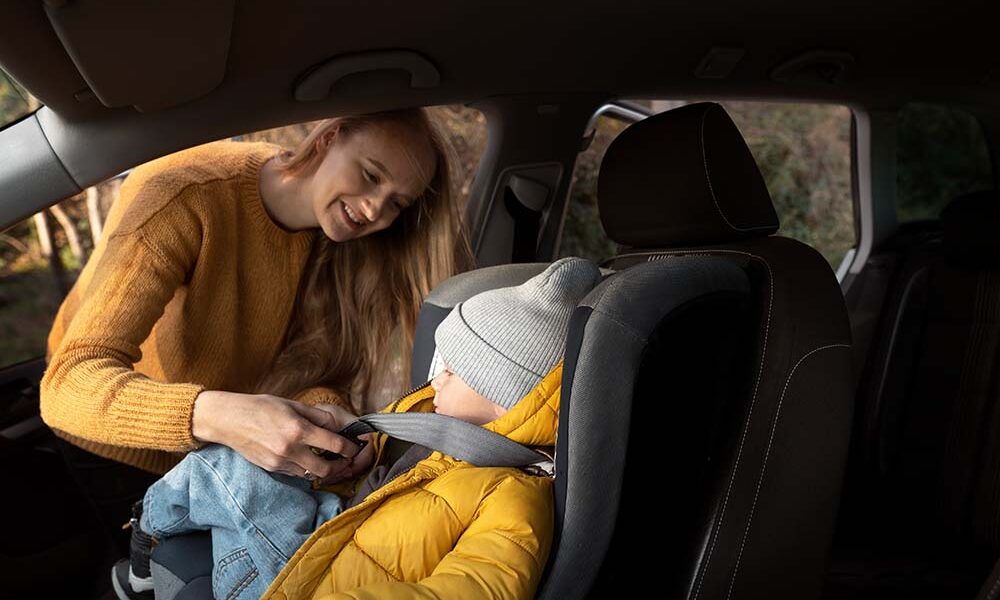Having a toddler who suddenly hates the car seat can be a challenging situation for parents. It can lead to stress, frustration, and even safety concerns. In this article, we will explore five potential reasons your toddler may develop a sudden dislike for car seats. Also, we will provide twelve actionable tips to help you address this issue and ensure a safer and more enjoyable car ride for both you and your little one.
5 Potential Reasons Your Toddler Suddenly Hates Car Seats
1. Sensory Overload
Some toddlers may become overwhelmed by the sensory experience in the car seat, leading to this situation where your toddler suddenly hates the car seat. The combination of unfamiliar sights, sounds, and movements can lead to discomfort or distress.
Understanding your toddler’s sensory sensitivities and providing appropriate accommodations can help ease their aversion to the car seat.
2. Restricted Movement
Toddlers are naturally curious and full of energy. Sitting in a car seat restricts their ability to move freely and explore their surroundings. Kids dislike being constrained and can do anything to escape such a situation.
Therefore, the quest for freedom could be another reason your toddler suddenly hates the car seat. This confinement can lead to frustration and resistance. Addressing their need for movement within the car seat can make them more comfortable and reduce their aversion to the car seat.
3. Fear or Anxiety
Fear or anxiety related to car rides can contribute to a toddler’s sudden dislike for the car seat. They may associate car rides with negative experiences, such as past discomfort or motion sickness. Identifying and addressing the underlying fears or anxieties can help ease their aversion and mitigate your toddler’s sudden hatred for the car seat.
4. Discomfort or Pain
Your toddler suddenly hates car seats probably because the car seat inflicts physical pain or discomfort on them. It could be because of improper fit, uncomfortable padding, or even an underlying medical condition.
Ensuring that the car seat is correctly installed and regularly checking for any discomfort can ease their distress and reduce their aversion to the car seat.
5. Desire for Independence
Toddlers crave independence and autonomy, and if your car seat cannot provide them with that, they are going to revolt. Sitting in a car seat can make them feel restricted and dependent on others, leading to resistance and aversion. Acknowledging their need for autonomy while maintaining their safety is crucial in addressing their sudden dislike for the car seat.
What to Do If Your Toddler Suddenly Hates Car Seats
1. Make it a Familiar and Comfortable Space
Personalize the car seat with familiar items such as blankets, stuffed toys, or special pillows. This will create a sense of familiarity and comfort, making your toddler more at ease during car rides and reducing their aversion to the car seat.
2. Keep Your Toddler Engaged
Provide interactive toys, books, or games that can keep your toddler engaged and distracted during car rides. This will help redirect their attention from their dislike of the car seat and mitigate the situation.
3. Use Distractions and Entertainment
Play their favourite music, nursery rhymes, or audiobooks during car rides. This can be a pleasant distraction and make the car seat experience more enjoyable for your toddler.
4. Adjust the Temperature and Ventilation
Ensure that the car’s temperature and ventilation are suitable for your toddler. This is important because sometimes the reason your toddler hates the car seat may not be about the car seat but the temperature of the car itself. Extreme temperatures can make them uncomfortable and irritable, further intensifying their aversion to the car seat.
5. Create a Positive Association
Associate the car seat with positive experiences by providing small rewards or treats after a successful car ride. This sounds unlikely, but it truly works. If your toddler hates sitting in the car seat, especially during long travels, promise them a reward if they can stay calm in the seat. And always keep to your promise. This positive reinforcement will help your toddler develop a positive attitude towards the car seat and reduce their aversion.
6. Ensure Proper Fit and Positioning
Check that the car seat is properly installed and adjusted to fit your toddler’s size and age. Uncomfortable positioning or incorrect adjustments can lead to discomfort and dislike. Ensuring a proper fit and positioning will contribute to their comfort and reduce their aversion to the car seat.
7. Consider Alternative Seating Options
If your toddler consistently refuses the car seat, consider alternative seating options such as convertible car seats or booster seats. Consulting with a child passenger safety technician can help you find the most suitable option for your child’s needs, and this tip can help you address this situation.
8. Plan Frequent Breaks
Plan frequent breaks during long car rides to allow your toddler to stretch their legs and release pent-up energy, which can ease their restlessness and resistance towards the car seat. In the first place, before now your toddler enjoyed sitting quietly without complaining but now, he suddenly hates the car seat. It could be because he stays too long on it during long-distance travels.
Check These 12 Simple Travel Tips for Busy Moms
9. Time Car Rides Strategically
Schedule car rides during your toddler’s most relaxed and happy times of the day, considering their mood and needs. Avoid scheduling car rides when tired, hungry, or irritable, as this can exacerbate their dislike of the car seat.
10. Communicate and Empathize
Talk to your toddler about their feelings and fears related to the car seat, acknowledging their emotions and validating their experience. This open communication can help them feel heard and supported, and this can positively change their feeling of dislike toward the car seat.
11. Involve Your Toddler in Decision-Making
Give your toddler some control over their car seat experience by allowing them to choose certain aspects, such as the toy they want to bring or the music they want to listen to. This involvement can foster a sense of autonomy and cooperation, reducing their resistance towards the car seat.
12. Seek Professional Advice if Needed
If your toddler’s aversion to the car seat persists despite your efforts, it may be beneficial to consult with a paediatrician or a child development specialist. They can provide additional guidance and evaluate any underlying issues that may cause the dislike, helping to address this situation of your toddler’s sudden hatred of the car seat.
Wrapping Up
Having your toddler suddenly hate the car seat can be challenging, but by understanding the reasons behind their dislike and implementing appropriate solutions, you can help create a safer and more enjoyable car ride for both you and your little one.
By addressing sensory overload, allowing movement within the seat, addressing fears or discomfort, respecting their desire for independence, and following the provided tips, you can ease their aversion to the car seat.
FAQs (Frequently Asked Questions)
How can I make my toddler’s car seat more comfortable?
You can make the car seat more comfortable by adding padding, using soft blankets or pillows, and ensuring proper adjustments for a snug fit.
What if my toddler unbuckles the car seat straps?
If your toddler unbuckles the straps, calmly pull over to a safe spot and explain the importance of wearing the seatbelt. Reiterate that it’s for their safety and buckle them back in securely.
What should I do if my toddler throws tantrums in the car seat?
If your toddler throws tantrums, try to remain calm and offer reassurance. Use distraction techniques, such as singing or playing their favourite songs, to redirect their attention and help calm them down.
Can I use a different type of car seat for my toddler?
Depending on your toddler’s age and weight, you may consider using a convertible car seat or a booster seat. Consult with a child passenger safety technician to determine the most suitable option.
How long will my toddler dislike the car seat?
Each child is unique, and the duration of their dislike for the car seat may vary. By addressing the underlying reasons and implementing appropriate strategies, you can gradually help your toddler become more comfortable with it.



